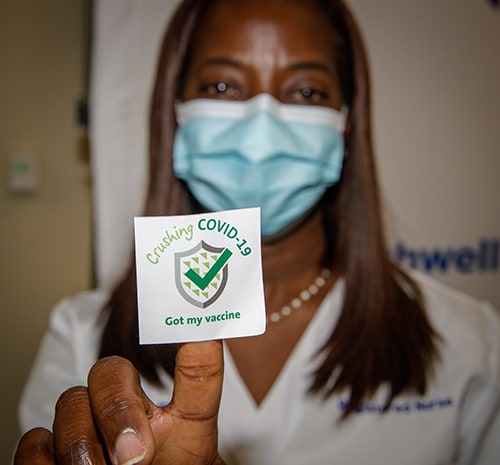Nurse Who Got First COVID Shot Receives Medal of Freedom
Sandra Lindsay, RN, realizes she isn’t a well-known celebrity, pop culture icon, or civil rights champion like others on the list who received the Presidential Medal of Freedom today. She says that’s what makes the honor even sweeter as a New York nurse who was the first American to receive a COVID vaccine outside of a clinical trial. She continues to advocate for vaccination, as well as mental health services for healthcare workers.
“My immediate thought was how significant this is for not only me and my family, but women, women of color, immigrants, Jamaicans, and healthcare workers,” Lindsay told Medscape Medical News about receiving the award. “Personally, I feel it is a great moment for all of the groups I identify with.”
Originally from Jamaica, the 53-year-old critical care nurse is director of patient care services at Northwell Health’s Long Island Jewish Medical Center in New York City. On December 14, 2020, she volunteered to receive the shot and became the first person in the country to receive the novel COVID vaccine. More than 200 million people are fully vaccinated today, according to the Centers for Disease Control and Prevention’s latest reports.

New York City nurse Sandra Lindsay. “I wanted to do my part,” said the critical care nurse and director of patient care services at Northwell Health’s Long Island Jewish Medical Center. “I wanted to feel safe.”
Lindsay joins 16 other Americans named by President Joe Biden as recipients of the Presidential Medal of Freedom, “the nation’s highest civilian honor presented to individuals who have made exemplary contributions to the prosperity, values, or security of the United States, world peace, or other significant societal, public or private endeavors,” according to a White House press release.
The list includes such public figures as actor Denzel Washington, Olympic gymnast Simone Biles, former congresswoman Gabrielle Giffords, former senator John McCain, and Apple co-founder Steve Jobs.
Hope Amid the Healing
A nurse for more than 27 years, Lindsay believes she received for the award based on her contribution during the healthcare crisis. “I volunteered to be vaccinated at a time when a lot of folks, a lot of Black folks, were skeptical about being vaccinated. There was a lot of misinformation,” she said.
She explains that after witnessing the trauma of the pandemic firsthand and its impact on medical professionals, “I wanted to do my part. I wanted to feel safe.”
Lindsay says she never second-guessed her decision to be the first in line for vaccination. “I did research and read studies about people who had been tested and the results. I weighed out the pros and cons.”
For her, the fear of contracting COVID was stronger than any misgivings she might entertain about receiving the vaccine. “That day I saw hope; I saw healing. I saw the turn in the way things were going; less deaths.” With vaccination, she visualized COVID improving.
“I’m pleased with the vaccination rate in New York. I’m pleased and happy people are getting back to some semblance of normalcy…We still see cases, although not to the extent” as before vaccinations began, she says.
In her current role, Lindsay onboards critical care workers, ensures her staff has proper PPE and that beds are available, among other duties. She concedes, “there are still many unknowns” about the virus, but millions have received vaccines “with minimum adverse effects.” For those who still have questions about the vaccine, she responds: “It’s OK to have questions.” But it’s riskier not to be vaccinated.
Receiving the award, she says, spotlights the role nurses and medical professionals played over the past 3 years “saving lives, getting the nation back on its feet…their selflessness, their true commitment, their tremendous contributions to get where we are now.”
Today Lindsay advocates for vaccination along with mental health for healthcare workers. “We helped heal the nation when the nation needed healing. We’ve seen a lot of progress. Now it is time for nurses to get what they need, as well.”
She says she hopes mental health will be prioritized nationwide “without being judgmental, so people get the services they need, so there’s no inequity in being able to provide services.”
For more news, follow Medscape on Facebook, Twitter, Instagram, YouTube, and LinkedIn
Source: Read Full Article


